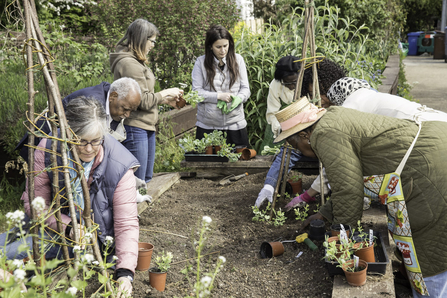
Community gardening. Image by Penny Dixie.

Community gardening. Image by Penny Dixie.
A diverse and inclusive workforce is critical for charities and other organisations working to address nature loss and climate change, according to a new report published today by The Wildlife Trusts.
The Wildlife Trusts’ Diversity Report 2023 explores the diversity of staff and trustees across the movement of 46 charities, which collectively make up The Wildlife Trusts. It includes analysis of gender, age, ethnicity, sexual orientation, and disability status, as well as examining pay gaps. Findings include:
The report highlights what The Wildlife Trusts are doing to ensure they have a progressive approach to diversity and inclusion. All 46 Wildlife Trusts have adopted a framework called Wild About Inclusion which focuses on inspiring, empowering, and engaging people from all backgrounds, cultures, identities, and abilities to play their part in nature recovery and climate action.
The benefits of the Wild About Inclusion approach are:
Miriam Bentley-Rose, strategic lead for equality, diversity and inclusion at The Wildlife Trusts, says:
“Everyone should feel confident exploring careers with environmental organisations and getting involved in projects that support nature’s recovery. We welcome people of all abilities, identities, backgrounds and experiences to join us in taking action for nature. We know there is more to do to increase diversity among our staff and trustees and we are putting measures in place to do that.
“Greater diversity means different ideas and perspectives, which are essential ingredients for accelerating nature’s recovery across the British Isles. With one in six species at risk of extinction, we need as many people as possible to play their part.”
Demmi Robinson, Northumberland Wildlife Trust Equality, Diversity and Inclusion Lead Officer says:
“We are committed to ensuring our movement is inclusive and welcoming to all. But, while we’re proud of our new approach to inclusion and delighted by the high number of young trustees and the way that our staff, in some respects, reflect our society’s diversity, under-representation of staff and trustees of non-white ethnicity across the federation shows that we still have vital work to do.
“Every person should feel empowered to stand up for the natural world and every community should be able to enjoy nature and wildlife wherever they live. Unfortunately, access to nature is deeply unbalanced and this exacerbates health inequalities. We want to see more public green spaces and community gardens, plus investment and ambition to connect existing hotspots for wildlife. Community nature recovery projects can contribute to getting 30% of the UK dedicated to nature by 2030.”
The report shows how The Wildlife Trusts are undertaking a range of different projects and training initiatives to progress equality, diversity and inclusion (EDI) among staff, including:
In 2023, The Wildlife Trusts were awarded the bronze award for the Employers Network for Equality and Inclusion’s Talent Inclusion Diversity Evaluation (TIDE). TIDE has over 200 questions that scores organisations on eight areas of EDI work.